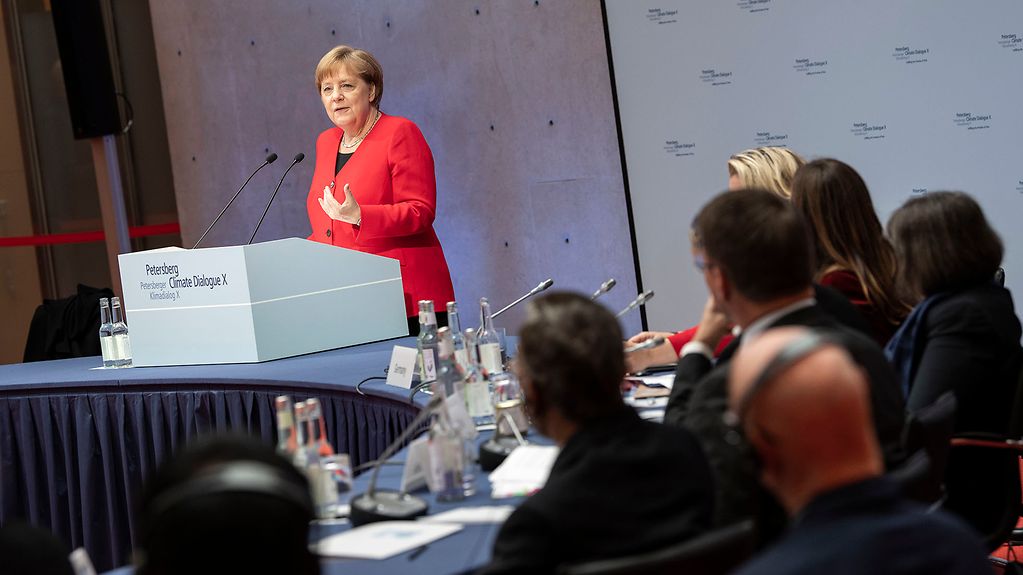10th Petersberg Climate Dialogue
"In the field of climate change mitigation it is right to take a long-term approach," said the Chancellor at the Petersberg Climate Dialogue. "The question is not what it will cost, but how much more it will cost if we don’t do anything." She also announced that she would be attending the UN Climate Summit in New York in September 2019.
3 min reading time

The Chancellor reiterated the goal of a carbon-neutral Germany by 2050
Photo: Bundesregierung/Bergmann
Under the banner "Fulfilling the Promise of Paris", international representatives met in Berlin to discuss worldwide climate goals. Delegates from 35 states took up the invitation issued by Federal Environment Minister Svenja Schulze to attend the tenth Petersberg Climate Dialogue in Berlin.
Decisions for the Climate Cabinet
In her address, Chancellor Angela Merkel spoke about intensive discussions within the Climate Cabinet regarding the path Germany should take to achieve carbon neutrality by 2050. "The discussion is not about whether we can achieve it, but about how we can achieve it," said the Chancellor.
That doesn’t mean that there will be absolutely no more greenhouse gas emissions, but that these emissions must be offset by afforestation or carbon sequestration and storage. Renewable energy is also making an important contribution to reducing harmful emissions, she added. "More than one kilowatt hour in three of power is now generated from wind, hydropower or solar power," reported Angela Merkel.
EU initiative for climate neutrality
The Chancellor also spoke about a climate initiative launched by nine EU member states, which aims to make the EU climate neutral by 2050. If the Climate Cabinet can find a "reasonable response", Germany could join the initiative, she said. "I would like to see us being able to do that," she stressed.
Angela Merkel described the planned end to the use of coal to generate power by 2038 as a "major feat" and described it as an important milestone. "We must ensure acceptance within society for this transformation, and we must engage in a broad-based discussion." In the weeks to come, the Cabinet will be adopting the main outlines of measures to bring about a structural transition in the coal-producing regions affected. There are plans to provide billons of euros of assistance. The German government she declared, would deliver on its promises.
1.5 billion euros for the Green Climate Fund
The Chancellor pointed to the replenishment of the Green Climate Fund as an important part of international climate change mitigation. Germany has announced that it will be providing a total of 1.5 billion euros for this. "It would be good if lots of countries were to contribute," she declared.
The Climate Dialogue was jointly chaired by Federal Environment Minister Svenja Schulze and her Chilean counterpart Carolina Schmidt. "The Petersberg Climate Dialogue has already helped build trust and provide a forum for constructive discussions. The meetings have thus paved the way for great steps forward and for major decisions," said Svenja Schulze.
The Petersberg Climate Dialogue has become an important date in international climate-related diplomacy and serves to prepare for the United Nations Climate Change Conferences (COP). Participants produce impetus for the further implementation of the 2015 Paris Agreement.
Financing and implementing national climate targets
2019 marks the start of a new phase in international climate change mitigation, said the minister. "In future, the focus will be less on negotiating rules, and more on implementing climate protection measures and concentrating on cooperation as we do so."
At the end of 2018, international partners meeting in Kattowice agreed on joint rules and regulations for the Paris Agreement. The focus of this year’s Climate Dialogue is thus on financing, implementing and improving national climate targets.
Emissions are still rising globally, said Svenja Schulze. All efforts must focus on reversing this trend. "The detailed regulations for the Paris Agreement mean that since the last Climate Change Conference there has been a fixed international framework."
In the Paris Agreement all states set themselves national climate targets, knows as nationally determined contributions, or NDCs. However, these targets are not yet adequate to keep global warming below 2 degrees Celsius, and ideally to keep it to 1.5 degrees Celsius. By 2050 Germany aims to reduce emissions of carbon dioxide (CO2), the most important greenhouse gas, by 80-95% of the 1990 levels.